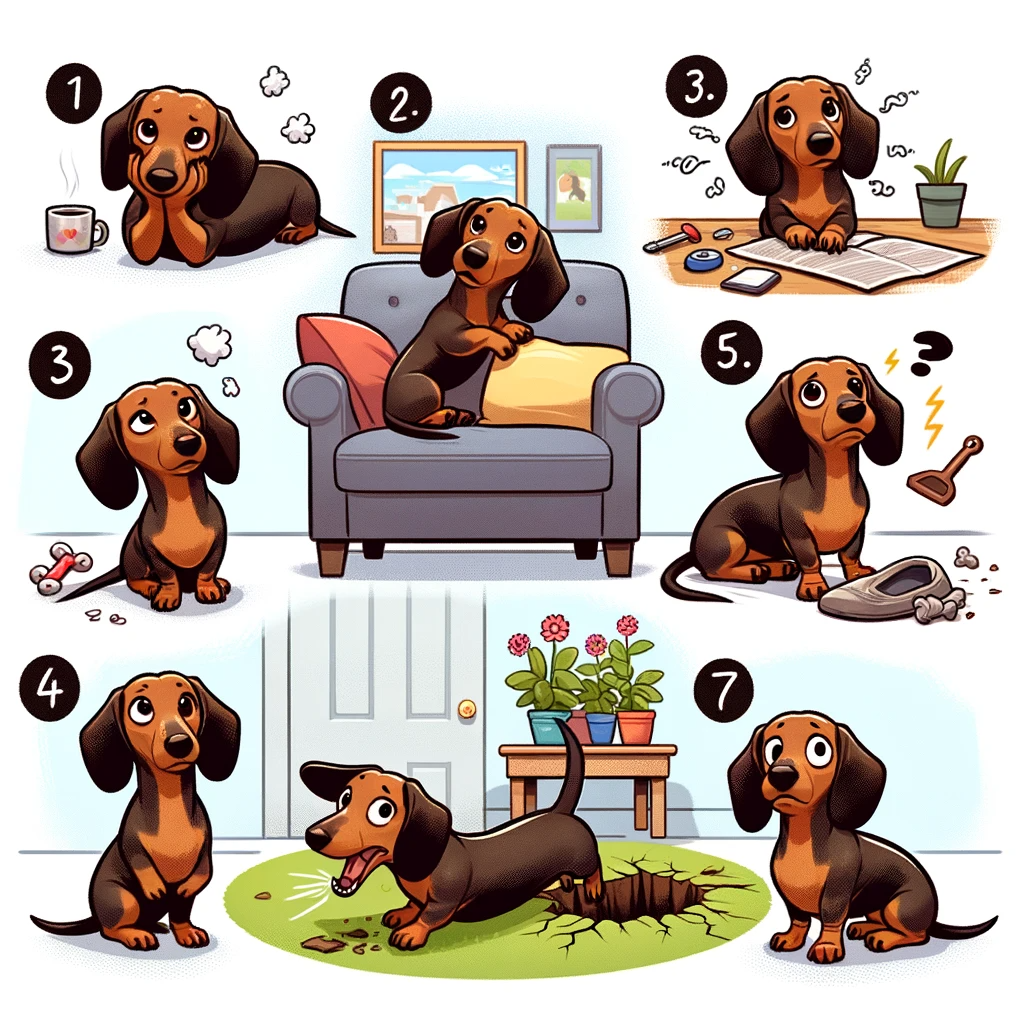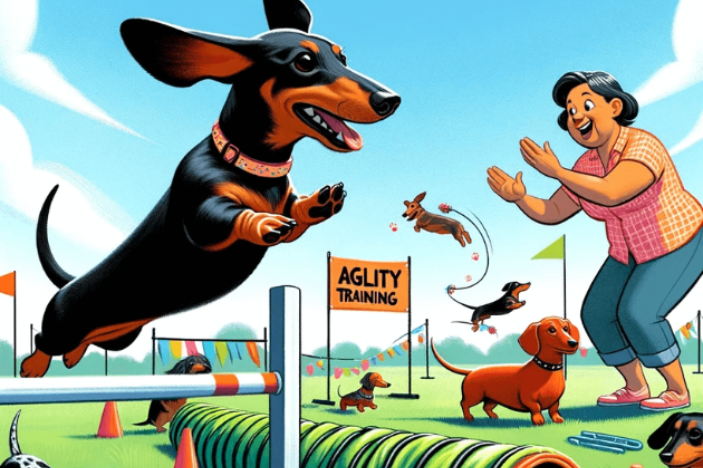A Comprehensive Guide to Dachshunds Health Issues
If you’re a veterinarian or pet owner, you know that dachshunds are one of the most popular dog breeds in the world. But what do you know about their health? In this comprehensive guide, we’ll explore all common health issues in dachshunds—including everything from fun facts to treatment options. So whether you’re just starting out, or have been caring for your furry friend for years, this guide is for you!
What are the Health Problems of Dachshunds?
Dachshunds are a type of dog that is known for being healthy and fit. However, there are a few health problems that can affect them and they can be avoided if knowledge about these problems is understood. the most common health problem in Dachshunds is hip dysplasia, which is an issue with the hip joint. Hip dysplasia can cause lameness, pain, or difficulty walking due to the joint’s instability.
Other health problems that can occur in Dachshunds include pancreatitis (a condition caused by pancreatic cancer), urinary tract infections (UTIs), heartworm disease, and leukemia. disc disease In order to prevent these health issues from happening, it is important to have regular vet check-ups and treatments for all of your dogs.
What are the Health Problems of Dachshunds and How Can They Be Avoided?
In addition to knowing about the health dangers of your dog, it is also important to be aware of ways you can avoid them. Some tips on how to avoid hip dysplasia in your dog include.
- Check for hips at least once a year while your dog is still young;
- Make sure your pup has routine vaccinations against papillomas (a type of cancer) and other worms that could harm his hip;
- Minimize physical activity around his hips by keeping him inactive during specific times of day;
- If he experiences pain or lameness in his hips, see a veterinarian as soon as possible;
- Many owners find that chiropractic care—or any form of exercise—can help improve their dogs’ hips.
How to Beat Back the Common Health Issues Associated With Intervertebral Disc Disease?
The condition of intervertebral disc disease affects the spine. It can be caused by a variety of things, including carpal tunnel syndrome, spinal cord compression, and multiple sclerosis. Depending on the person’s condition, intervertebral disc disease can cause a variety of health problems.
The prevention and treatment of intervertebral disc disease start with understanding the causes and symptoms of the condition. Once you know what’s happening with your dachshund, you can take steps to prevent any health problems from developing.
Some common causes of intervertebral disc disease include spine fractures, heavyweight exercises that overload the discs, and incorrect sleeping of dachshunds. If you are dealing with any of these issues, seek help immediately. As like
- Low back pain
- Hip dysplasia.
- lameness, pain,
- Joint instability.
- Urinary tract infections.
- Muscle weakness
- Headache
- Diabetes mellitus
- Sleep problems
- Severely reduced range of motion
- Inability to walk or stand
- Age-dependent worsening of symptoms
Low back pain
There is no definitive answer to this question as it depends on a number of factors including the dog’s age, weight, and genetics. However, back pain in dogs can be caused by conditions such as disc herniation or idiopathic lumbosacral cord syndrome.
In these cases, bone spurs or other structural changes in the spine can cause inflammation and pain in the lower back. Low back pain is also sometimes caused by degenerative changes in the discs that can lead to spinal stenosis.
Treatment for low back pain usually includes physical therapy sessions with anti-inflammatory medications and analgesics aimed at restoring range of motion and relieving pressure on the nerve roots below the level of the affected disc.
Hip dysplasia.
Hip dysplasia is a common health problem in Dachshunds, and it can be caused by a number of things. It is caused by a lack of muscle mass in the hip joint. This can make it difficult for the dog to move his hips properly and cause other problems, such as arthritis.
Hip dysplasia is treated with surgery or by getting the dog used to walk on two legs. Sometimes, it’s just a simple issue – like a lack of exercise but other times, it can lead to more serious problems. For example, hip dysplasia can cause the dog to have trouble moving his hips properly.
This can make it difficult to move around and participate in activities like playing fetch or running. And because he doesn’t have the same range of motion as other dogs, he can also get injured if he falls. Hip dysplasia is also a risk for developing arthritis later in life.
Lameness Pain
Dachshunds are known for their soft fur and floppy tails, but they also have a number of health problems. One of the most common is lameness, which can be caused by a variety of things, such as arthritis or other joint problems. The pain that Dachshunds often experience is called “lameness neuropathy,” and it’s usually quite severe. In some cases, the lameness is so bad that the dog can’t move at all.
Joint instability
Dachshunds are known for their quick reflexes and are excellent 1981 athletes. However, they can also suffer from a common health problem called e joint instability. This is a condition that affects the connective tissue in their joints, which can make them difficult to move and use their paws correctly.
If left untreated, this condition can lead to serious problems for the Dachshunds. There is an increased incidence of joint instability in Dachshunds due to their young age and lack of experience with agonism. The most common cause of joint instability in this dog breed is joint instability, which is a condition caused when the two articular cartilage on the dog’s collar bones start to reset.
Urinary tract infections.
Many people are unaware of the health problems that can be caused by Dachshunds, as these dogs are typically considered to be friendly and playful. However, this does not mean that there aren’t any dangers associated with them – in fact, urinary tract infections (UTIs) are one of the most common health concerns faced by these dogs.
UTIs can lead to serious health problems for dogs, and can often be difficult to treat. If left untreated, UTIs can lead to renal failure, blindness, and other serious problems. These infections can be caused by many things,
but the most common are bacteria from the dog’s stools. Some dogs have an infection that affects their bladder and other organs, called pyelonephritis. This condition can make the dog very sick and cause severe pain in the lower back and legs. Other problems that can occur from Dachshunds urinary tract infections include:
- inflammatory bowel diseases (IBD) such as Crohn’s disease or ulcerative colitis
- pneumonia
- chronic UTI (urinary tract infection)
- sepsis
- urethritis
Muscle weakness
Muscle weakness is a common condition in dachshund dogs, and it can be caused by a number of factors. These include hereditary traits, genetic abnormalities, age-related decline, or toxicity. If left untreated, muscle weakness can lead to instability and poor balance, which can be dangerous for both your dog and you.
Headache
Headaches in dachshund dogs can be the result of one or more of the following: cranial cruciate ligament (CCL) tear, meningitis, brain tumor, sinus infection, middle ear infection, food allergy/sensitivity. If left untreated, it can progress to chronic pain and eventually neurological problems such as seizures or paralysis. It is important to start with your veterinarian for a diagnosis and treatment plan specific to your dog’s situation.
Diabetes mellitus
Diabetes mellitus is a metabolic disease that occurs when the body does not produce or use insulin properly. Diabetic dog patients are unable to absorb glucose from the blood, due to which the blood sugar level increases. It can damage small blood vessels throughout the body and lead to a number of complications, including kidney failure, heart problems, and blindness
Sleep problems
Sleep problems are a common problem that can lead to many other health problems. They can be a major cause of memory loss or confusion, severe loss of range of motion, and age-related worsening of symptoms in dogs.
Lack of sleep has been linked to an increased risk of conditions such as heart disease, diabetes, obesity, and depression. It also increases stress levels and impairs cognitive function. All these factors make sleep problems a major cause for concern!
There are several things you can do to improve your dog’s sleeping habits: Get them used to going outside during the day. establish regular bedtimes. Only allow interruptions if necessary; Exercise them regularly before bed keep their physical activity light And keep the noise level outside your bedroom down so they stay comfortable in their space.
Severely reduced range of motion
Severely reduced range of motion (SROM) is a common disorder in dachshunds dogs and may be the result of various causes, including injury, arthritis, or spinal cord compression. If you notice your dog has significantly decreased mobility or is struggling to move normally on all four legs, it’s important to seek veterinary attention as soon as possible.
Inability to walk or stand
This could be a sign of some underlying medical condition that should be evaluated by a veterinarian. Additionally, there are many possible causes of disability in the dachshund dog, including arthritis, tumors, and multiple sclerosis.
If you think your pet may have any of these conditions, it’s important to get them checked out as soon as possible. If the cause of the dachshund’s inability to walk or stand is unknown or cannot be determined at this time, treatment options may include pain relievers and physical therapy.
However, if the condition does not improve with conventional treatment, then surgery may be necessary. Always consult a qualified veterinarian before making any decisions about your pet’s health.
Age-dependent worsening of symptoms
Symptoms in dachshund dogs usually worsen with age, but there is still no clear cause or solution. Some theories suggest that this may be due to increased frequency and severity of illness, changes in digestion, and decreased overall health. It’s also possible that the aging process itself can cause worsening symptoms.
There is no guarantee that treatment will work for every dog, but addressing any underlying causes of discomfort as soon as possible can help improve their quality of life.
Recognize the symptoms of intervertebral disc disease.
It’s important to know what to look for when it comes to symptoms. For example, if you notice your dog’s back getting tight or in pain when your dog moves around, that may be a sign that your puppy has intervertebral disk disease. Similarly, if your dog experience problems with balance or coordination, those might also be signs that your dog’s discs are at risk for damage.
Take precautions to avoid health problems associated with intervertebral disc disease.
To avoid dachshund any health problems from developing, it’s important to take dog precautions when moving about the body and spending time in different positions. You can do this by following these tips:
- Stay hydrated: Drink plenty of fluids every day to stay healthy and balanced; water is a great choice for preventing dehydration because it doesn’t affect nerve cells as adversely as other liquids;
- Watch out for your dachshund for falls: Be sure not to trip or fall while trying to ascend stairs or walk down them; even small mistakes can lead to bigger problems;
- Be regular about checkups your cute friend: Make sure you get regular checkups on your discs so that your doctor can see if there are any changes or injuries that need attention;
- Get physical therapy: Taking regular physical therapy will help improve balance and coordination;
- Think about healthy living habits: Make sure your dog is eating a healthy diet and getting enough exercise, both of which will help reduce the risk of developing intervertebral disk disease in the future.
Tips for Beating Back the Health Issues Associated With Intervertebral Disk Disease.
Sufficient rest and relaxation are key to preventing health problems from developing. Excessive work and stress can lead to an overactive immune system, which can create problems for the discs in your dog’s spine.
Try to avoid your dachshund working out too hard and getting overexcited, and limit the dog to a moderate exercise routine. Exercise technique is another important factor in preventing health problems from developing.
Use proper form when exercising, and be sure not to overload your discs by playing too many sports or doing too many activities at once. If your dog does experience any health problems, get medical help as soon as possible!
Use Proper Exercise Technique.
By following these tips, you can help keep your dog’s discs healthy and functioning properly:
- Stay active: Incorporate plenty of physical activity into your dachshund lifestyle so your friend is able to maintain a good balance on their feet without putting undue stress on their disks.
- Avoid excessive weight or weight training: Heavyweights, sprinting, jumping high – these activities may cause damage to the discs in your dog’s spine. Instead, try lighter weights or exercises that won’t put too much strain on them (like yoga).
- Use correct form: Make sure you use the correct amount of pressure while exercising – too much force may result in injury or even disk failure.
- Keep a healthy diet: Eating right will help prevent health problems from developing in the first place while cutting back on unhealthy foods can also help reduce stress on your disks.
Conclusion
There are many health issues associated with Intervertebral Disk Disease. While it is important to be aware of the symptoms and take precautions to avoid health problems, it is also important to beat back the common health issues associated with this condition.
By learning about Prevention and Treatment, being aware of the symptoms of disk disease, taking proper exercise techniques, reducing your dog’s risk of developing health problems, and getting help from a doctor if your dog experiences any health issues, you can prevent your dog from developing any serious medical issues.





